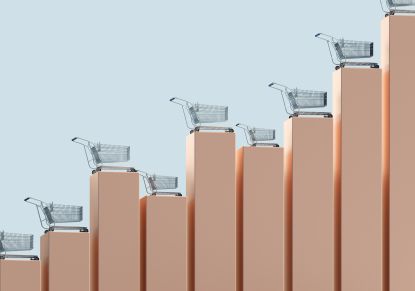CPI inflation falls faster than expected in June
The rate of CPI inflation came in below expectations for June, giving a welcome boost to the Bank of England, the government and consumers.


It looks as if the Bank of England (BoE) is finally starting to win its battle against inflation. After hiking interest rates 13 consecutive times, the headline rate of inflation in the UK finally appears to be heading in the right direction.
The latest figures out from the Office for National Statistics (ONS) show UK annual headline CPI inflation was 7.9% in June, lower than expectations of 8.2%. That figure represents a welcome retreat from May’s reading of 8.7%, which was far higher than policymakers and economists were projecting.
The lower-than-expected, reading for June will come as a welcome relief for the central bank, the government and most importantly, consumers.
Subscribe to MoneyWeek
Subscribe to MoneyWeek today and get your first six magazine issues absolutely FREE

Sign up to Money Morning
Don't miss the latest investment and personal finances news, market analysis, plus money-saving tips with our free twice-daily newsletter
Don't miss the latest investment and personal finances news, market analysis, plus money-saving tips with our free twice-daily newsletter
The inflation problem
At 7.9%, CPI inflation is now sitting at its lowest level since March 2022. But there’s a lot more for the BoE to do. Core inflation, which strips out volatile food and energy prices, declined to 6.9% in June. That's lower than the 31-year high of 7.1% recorded in June, but it's still uncomfortably high - the BoE’s target for CPI inflation is 2%.
Lower fuel prices had the biggest impact on the headline figures. Thanks to lower petrol and diesel prices compared to June 2022, the price of transport fell by an annual rate of 1.8%.
Food inflation also slowed, easing to 17.3% from 18.3% in the previous month.
“Dips in the cost of motor fuels as well as food and non-alcoholic drinks, furniture and household goods, and restaurants and hotels helped to depress the rate of price rises - which represents a course correction having been stuck in the mud in May. Crucially, there were no large offsetting upward effects, notes Myron Jobson, senior personal finance analyst at interactive investor.
“These price declines should give us some breathing room to absorb stubborn and sticky inflation in other key areas of expenditure, like food, which could persist for a little while longer before falling significantly,” he adds.
More notably, the ONS recorded negative annual growth of producer price inputs, such as parts and materials at manufacturing businesses in June. While this number does not impact headline inflation figures, it can be a good indicator of future price growth. A negative reading implies manufacturers may be able to ease off on passing higher prices onto consumers.
“Getting the inflation genie back into the bottle has proven troublesome for the Bank of England. The UK has the highest rate of the G7 economies, and the highest rate in western Europe, but there is now light at the end of the tunnel,” says Rob Morgan, chief investment analyst at Charles Stanley
However, “Despite today’s more encouraging inflation data, irradicating inflation will still take some more time and persistence from the Bank of England. That means households and investors getting used to structurally higher interest rates than they have been used to for much of the past decade,” Morgan continues.
What does this mean for interest rates?
Following today’s inflation reading, the market is no longer expecting the BoE to hike rates to 6.5% in the months ahead.
“Today’s CPI print could mean the BoE chooses to ease off on the dial with a smaller 0.25% increase rather than a previously widely expected 0.5% one at the monetary policy committee’s next meeting on 3rd August,” notes Morgan.
But this doesn’t mean the pain for mortgage holders is over just yet. As Morgan explains, “irradicating inflation will still take some more time and persistence” from the BoE.
He adds, “That means households and investors getting used to structurally higher interest rates than they have been used to for much of the past decade.”
That might not be good news for borrowers, but it could be great news for savers, who’re finally seeing some attractive returns on savings accounts.
Join us at the MoneyWeek Summit on 29.09.2023 at etc.venues St Paul's, London.
Tickets are on sale at www.moneyweeksummit.com
MoneyWeek subscribers receive a 25% discount.
Rupert is the Deputy Digital Editor of MoneyWeek. He has been an active investor since leaving school and has always been fascinated by the world of business and investing.
His style has been heavily influenced by US investors Warren Buffett and Philip Carret. He is always looking for high-quality growth opportunities trading at a reasonable price, preferring cash generative businesses with strong balance sheets over blue-sky growth stocks.
Rupert was a freelance financial journalist for 10 years before moving to MoneyWeek, writing for several UK and international publications aimed at a range of readers, from the first timer to experienced high net wealth individuals and fund managers. During this time he had developed a deep understanding of the financial markets and the factors that influence them.
He has written for the Motley Fool, Gurufocus and ValueWalk among others. Rupert has also founded and managed several businesses, including New York-based hedge fund newsletter, Hidden Value Stocks, written over 20 ebooks and appeared as an expert commentator on the BBC World Service.
He has achieved the CFA UK Certificate in Investment Management, Chartered Institute for Securities & Investment Investment Advice Diploma and Chartered Institute for Securities & Investment Private Client Investment Advice & Management (PCIAM) qualification.
-
-
 Top-quality small companies with big scope for long-term growth
Top-quality small companies with big scope for long-term growthA professional investor tells us where he’d put his money. This week: Dr Gareth Blades, analyst at Amati Global Investors, highlights three favourites.
By Nicole García Mérida Published
-
 Starling Bank hikes fixed savings rate to 5.25%
Starling Bank hikes fixed savings rate to 5.25%Starling Bank has hiked the rate on its fixed savings which has shot up from 3.25% to 5.25% - but how does it compare to the rest of the market?
By Vaishali Varu Published

